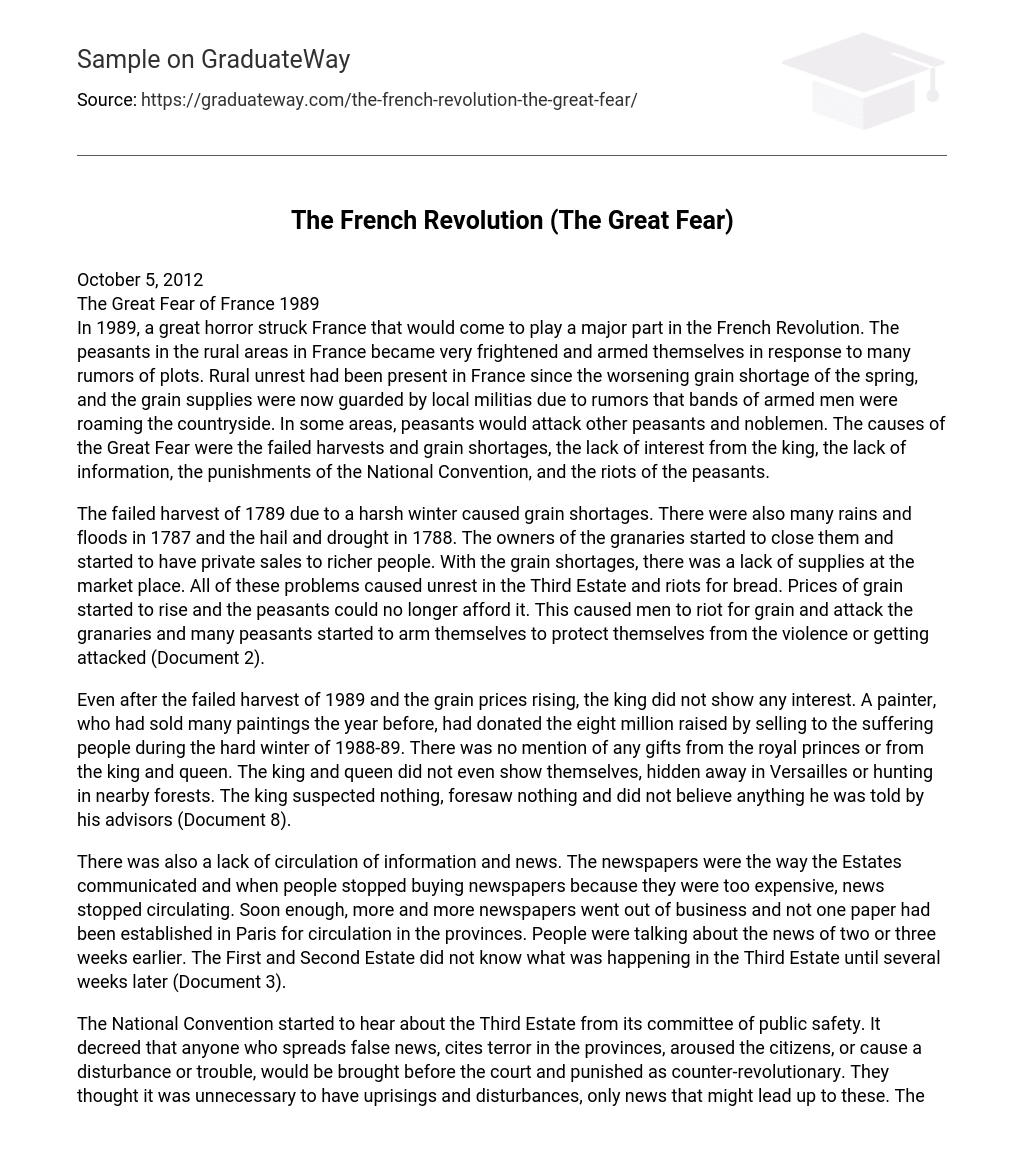October 5, 2012
The Great Fear of France 1989
In 1989, a great horror struck France that would come to play a major part in the French Revolution. The peasants in the rural areas in France became very frightened and armed themselves in response to many rumors of plots. Rural unrest had been present in France since the worsening grain shortage of the spring, and the grain supplies were now guarded by local militias due to rumors that bands of armed men were roaming the countryside. In some areas, peasants would attack other peasants and noblemen. The causes of the Great Fear were the failed harvests and grain shortages, the lack of interest from the king, the lack of information, the punishments of the National Convention, and the riots of the peasants.
The failed harvest of 1789 due to a harsh winter caused grain shortages. There were also many rains and floods in 1787 and the hail and drought in 1788. The owners of the granaries started to close them and started to have private sales to richer people. With the grain shortages, there was a lack of supplies at the market place. All of these problems caused unrest in the Third Estate and riots for bread. Prices of grain started to rise and the peasants could no longer afford it. This caused men to riot for grain and attack the granaries and many peasants started to arm themselves to protect themselves from the violence or getting attacked (Document 2).
Even after the failed harvest of 1989 and the grain prices rising, the king did not show any interest. A painter, who had sold many paintings the year before, had donated the eight million raised by selling to the suffering people during the hard winter of 1988-89. There was no mention of any gifts from the royal princes or from the king and queen. The king and queen did not even show themselves, hidden away in Versailles or hunting in nearby forests. The king suspected nothing, foresaw nothing and did not believe anything he was told by his advisors (Document 8).
There was also a lack of circulation of information and news. The newspapers were the way the Estates communicated and when people stopped buying newspapers because they were too expensive, news stopped circulating. Soon enough, more and more newspapers went out of business and not one paper had been established in Paris for circulation in the provinces. People were talking about the news of two or three weeks earlier. The First and Second Estate did not know what was happening in the Third Estate until several weeks later (Document 3).
The National Convention started to hear about the Third Estate from its committee of public safety. It decreed that anyone who spreads false news, cites terror in the provinces, aroused the citizens, or cause a disturbance or trouble, would be brought before the court and punished as counter-revolutionary. They thought it was unnecessary to have uprisings and disturbances, only news that might lead up to these. The National Convention was trying to contain the violence of the revolution, but was not very successful (Document 10).
The peasants were getting angrier and started a lot of riots. They would burn down villages and homes of noblemen and kill anyone who got in their way. The peasants would torture men until they give up their titles as noblemen. Paralyzed or wounded men were left to burn and die. The Great Fear was getting bloodier every day (Document 9).
In Georges Lefèbvre’s quote, when he says the Great Fear can be explained by the economic, social, and political problems in France in 1789, he is right because the economy fell because of the failed harvest, there was a lack of communication which caused the social problems, and the king did nothing and refused to believe anything people were telling him about the crisis can explain the political part of the Great Fear. Also, he was right when he said the Great Fear played its part in preparing for the revolution because it lead to much greater revolts and actions. It was not true, though, when he said that the Great Fear gathered the peasants together and allowed them to realize their strength because if anything, the Great Fear scared everyone and no one really banned together, peasants would attack other peasants too.
The failed harvest of 1789 and all the natural disasters, the lack of interest from the king, the lack of information, the threats of the National Convention, and the riots of the peasants were all causes of the Great Fear. The French were trying to mimic the Americans in overthrowing their government and this was the first step. The king had little interest in the affairs going on in the Estates and did not believe what anyone told him. No one felt safe anymore and the peasants started to arm themselves. The Great Fear was just the beginning of a bloody revolution in France.





